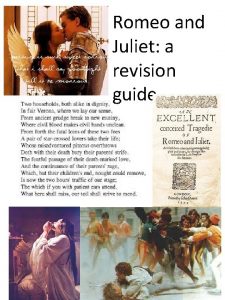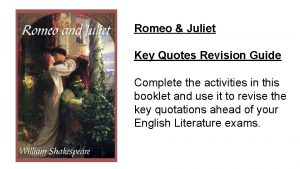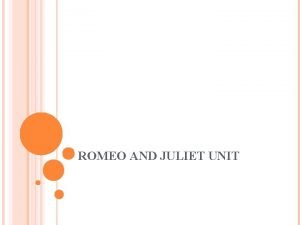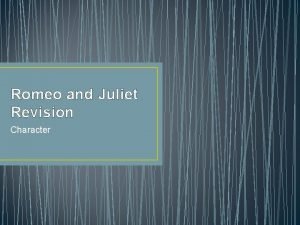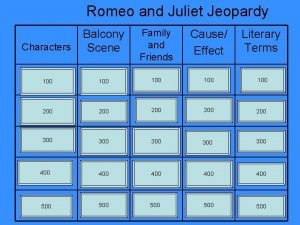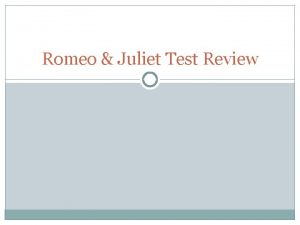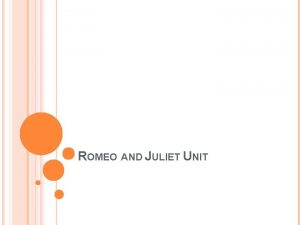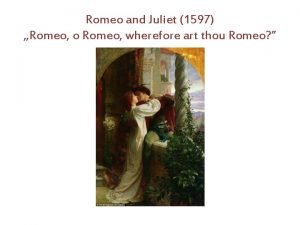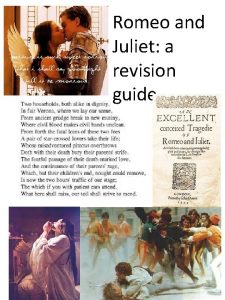Romeo and Juliet Revision Character How To Answer





















- Slides: 21

Romeo and Juliet Revision Character

How To Answer a Question on Character To answer a question well and improve your level you must start to use evidence from the play to support any ideas or opinions you may have. You have to prove your points…a bit like a detective.

How To Answer a Question on Character The way you show your evidence in English is to use PEA: Point – what idea do you have? Evidence – How from the play. can you prove this? Using evidence Analysis – Explain point HOW your evidence proves your

Example: Point Romeo is sad at the beginning of the play Evidence Analysis ‘Sad hours seem long’ This shows that because he is sad, his days are dragging with nothing to do but thinking about how nobody loves him.

Keeping this technique in mind, we will now look at a closer study of characters.

Character Study: Romeo 1. MOODY: This is our first impression of him. Rosaline has rejected his love and everyone knows that there is something the matter with him. 4. PASSIONATE: He loves Juliet passionately. After he sees her, he lives only to be with her, and their love is sudden and dramatic. He goes to extreme risks for her sake, and in the end dies, because without her, he believes he can no longer live. 2. IMPESTUOUS: He does not think of the consequences of his actions. It is Juliet who has to think of making wedding plans. When he goes to make arrangements with Friar Lawrence, he hurries him. The Friar is surprised at this hastiness, and tries to get him to slow down, but Romeo cannot be stopped. 3. VENGEFUL: When Tybalt kills his friend Mercutio, Romeo wants revenge and his fire-eyed fury drives him to kill Tybalt. In a moment of mad revenge he kills Juliet's cousin Tybalt and brings about a dramatic change in his fortunes.

Character Development When studying character we not only look at what type of person the character is but also how does that character change and develop over the course of the play? Whatever point you make about a character be able to refer back to a particular moment in the play or a quote to back up your opinion!

Character Development: Romeo at the Beginning: In Act 1 Scene I, Romeo is the typical adolescent lover who is in love with an unattainable love, Rosaline. He is depressed and seeks attention for his sadness. He is ready for love but has not yet found it: “Many a morning hath he there been seen, With tears augmenting the fresh morning’s dew Adding to clouds more clouds with his deep sighs. ” This is how Romeo’s father describes him.

Character Development: Romeo meets Juliet When Romeo meets Juliet in Act 1 Scene V, he abandons his former adolescent love and falls deeply and passionately in love with Juliet calling her a “holy shrine”. He is transformed from a reluctant lover to an eager one. From then on he defies danger and the Capulets, for example when he enters Capulet’s orchard to see Juliet. His mind is purified and his love is sincere and strong. “Call me but love and I’ll be new baptiz’d; Henceforth I never will be Romeo. ” Yet he is still lost in a world of imagination as Juliet makes the arrangements for their marriage. When Romeo meets his friends in Act 2 Scene IV Mercutio notices how Romeo has changed and remarks: “Why, is this not better now than groaning for love? now art thou sociable, now art thou Romeo. ” But Romeo still has not come down to earth.

Character Development: Romeo Married After his marriage to Juliet, Romeo is a new man, with a sense of responsibility and honour. In Act 3 Scene I he tries to treat Tybalt as a kinsman whom he loves. When Tybalt slays Romeo’s friend, Mercutio, Romeo avenges Mercutio’s death as a debt of honour: “. . . O sweet Juliet! Thy beauty hath made me effeminate” In the Friar’s cell later (Act 3 Scene III) Romeo loses his nerve temporarily but becomes a man again when he hears from Juliet, through the Nurse, that she needs him to comfort her. In the second balcony scene (Act 3 Scene V) it is Romeo who is more sensible and practical than Juliet: “I must be gone and live or stay and die. ” He is also tender and loving: “I will omit no opportunity That may convey my greetings, love, to thee. ”

Character Development: Romeo in Exile Romeo, in exile in Act 5 Scene I seems in happy mood, looking forward to news from the Friar that he may return to Juliet. Suddenly he hears of Juliet’s ‘death’ but does not despair or falter in self control. He reacts to the news relatively calmly. “Is it e’en so? then I defy you, stars!” He plans to be united with Juliet in death and buys poison. At the vault in Act 5 Scene 3 Romeo is decisive and allows no obstacle to stand in the way of his tragic purpose. He kills Paris but lays him by Juliet’s side. He heroically sacrifices himself for love by taking poison saying: “Thus with a kiss I die”. True love has transformed him from a moody youth to a more mature and heroic adult.

Character Study: Juliet 1. OBEDIENT: At the beginning of the play we see Juliet submissing humbly to her parents, and she seems more than willing to think about marrying Paris. 4. SECRETIVE: From being open and obedient, she turns into a young woman with secrets to hide from her parents. They know nothing of her romance and marriage to Romeo, nor of the sleeping potion she drank that makes her look like she's dead. 2. YOUNG: According to the conversation between Lady Capulet and the Nurse in the first scene, she is only 14 years of age. Her youth and inexperience makes us feel sorry for her. Even her father is reluctant to let Paris marry her, as he feels she is too young. 3. MATURE: Her romance with Romeo changes her completely – from obedient and shy to self-reliant and defiant. She is willing to change everything for this love. She is also the one who is the driving force in the relationship; she seems more aware of the difficulties and the solutions needed than the rash Romeo.

Character Development: Juliet at the Beginning: In Act 1 Scene III Juliet is an innocent and obedient daughter to the Capulets. She is not yet fourteen, the Nurse informs us. Juliet intends to cooperate with her parents wishes that she marry Paris: “I’ll look to like, if looking liking move. ” However, she does not promise to marry Paris but she will try to love him for her parents’ sake.

Character Development: Juliet meets Romeo When Juliet meets Romeo in Act 1 Scene V, she falls in love for the first time and reacts affectionately and sincerely to Romeo’s attempts to woo her. In the Balcony Scene Act 2 Scene II she expresses her deep love for Romeo: “My bounty is as boundless as the sea, My love as deep; the more I give to thee, The more I have, for both are infinite. ” She is practical and warns Romeo of the danger to his life if he is caught with her. It is she who suggest the arrangements for their marriage. In Act 2 Scene V we see the longing and impatience of Juliet to be with Romeo. In the marriage scene, Juliet describes her absolute love for him: “But my true love is grown to such excess I cannot sum up half my sum of wealth. ”

Character Development: Juliet Under Stress Only hours after her marriage to Romeo, Juliet’s happiness comes to an abrupt end when the Nurse brings news of Tybalt’s death at the hands of Romeo and Romeo’s banishment. She copes with the tragic news in a mature and dignified manner preferring death to separation. Just after the lovers sad farewell, Juliet is confronted with an arranged marriage to Paris, which she rejects decisively: “Now, by Saint Peter’s Church and Peter too. He shall not make me there a joyful bride. ” She becomes alienated from her parents and the Nurse, but shows strength and courage: “I’ll to the Friar to know his remedy: If all else fail, myself have power to die. ” In Act 4 Scene III, Juliet shows heroic courage as, all alone, she takes the Friar’s potion a day earlier than planned. Despite the horrors she imagines of being buried alive in the Capulet vault, she does not hesitate to abandon herself completely to her love for Romeo: “Romeo, I come! this do I drink to thee. ”

Character Development: Juliet in the Vault When Juliet awakens in the vault, she finds Romeo dead. She does not despair but firmly refuses to leave the tomb with the Friar. She shows heroic courage in killing herself with Romeo’s dagger. Juliet was also transformed by love, from an innocent child to a woman of heroic strength and self-sacrifice.

Secondary Characters Friar Laurence’s role in the play is very important. He is Romeo’s adviser and friend. He performs the wedding ceremony of Romeo and Juliet. He provides the potion for Juliet to avoid marriage to Paris. He plans to persuade the hostile families to accept their marriage in Act 3 Scene III but has little time to do so before catastrophe takes place. He wishes to bring peace to Verona but fails. His intentions are good but his plans go tragically wrong. As a person he is a holy and deep thinking man who has a good reputation. His advice to Romeo is appropriate: “Wisely and slow; they stumble that run fast” Despite his good advice, Friar Laurence is too hasty himself in forming his ill-conceived and risky plan to put Juliet to sleep. However, it is his kindness of heart which makes him take the risk since Juliet can find no other solution. In the end, horrified by the failure of his plan, he loses his composure and leaves Juliet to kill herself in the vault.

Secondary Characters The Nurse’s character in the play does not undergo any development but she is very important as Juliet’s messenger and adviser. She is worldly and practical and has no concerns about Juliet marrying Paris immorally. She had already praised Romeo but changes her mind as the circumstances change. She contrasts with Juliet’s fidelity to Romeo. She is vulgar and enjoys reminding Juliet of the physical side of love. She also enjoys teasing others, for example when she delays telling Juliet about her marriage plans. Despite her shortcomings, the Nurse is loyal to Juliet throughout the play. She meets Romeo to arrange the marriage, she fetches Romeo from the Friar’s when Juliet needs him to comfort her. She says to Romeo: “For Juliet’s sake, for her sake, rise and stand. ” She also stands up to Capulet when he turns on Juliet. Yet Juliet dismisses in the end when the Nurse cannot give her the understanding she needs. The Nurse’s realism and worldliness highlight the depth of Juliet’s idealism and love.

Secondary Characters Mercutio is light-hearted and witty, he loves word-play and his gaiety contrasts with Romeo’s depression in Act 1 Scene I. He teases Romeo about his infatuation for Rosaline: Mercutio is more realistic than Romeo and sees that real love must be grounded in the reality of the world around him. In Act 1 Scene IV he tries to advise Romeo to be more practical: “If love be rough with you, be rough with love; Prick love for pricking, and you beat love down. ” Mercutio is a loyal friend who cares about Romeo and looks out for him. Mercutio is also cynical at times and he is disgusted when Romeo refuses to fight Tybalt: “O calm, dishonourable, vile submission!” Unlike Tybalt, Mercutio bears no malice and dies cursing both houses:

Secondary Characters Tybalt’s one role is to display hot temper and anger which provoke the crisis in Act 3 Scene I. At the Capulet feast he recognises Romeo as a Montague and wants to fight. Later, in Act 3 Scene I, we see that Tybalt still holds a grudge against Romeo for this incident: “Romeo, the hate I bear thee can afford No better term than this – though art a villain. ” Tybalt’s main purpose in the play is to embody the spirit of hostility and revenge which is widespread among the Capulets

Secondary Characters Benvolio’s main role in the play is that of peacemaker who repeatedly intervenes on side of peace and common sense in the play. In the first scene he tries to stop the brawl between the servants. In Act 3 Scene I he tries to keep Mercutio off the streets since “the Capulets are abroad. ” He steps in on the side of Romeo when the Prince is trying to sort out the blame. His version of what happened is unbiased and entirely truthful. Benvolio’s other role is as comforter and friend to Romeo. Benvolio tries to help Romeo
 Romeo romeo where art thou romeo
Romeo romeo where art thou romeo Are the montagues rich
Are the montagues rich Romeo and juliet revision notes
Romeo and juliet revision notes Romeo and juliet revision quotes
Romeo and juliet revision quotes Who said o romeo romeo where for arthous romeo
Who said o romeo romeo where for arthous romeo Romeo and juliet act 2 scene 1 quotes
Romeo and juliet act 2 scene 1 quotes Conceit romeo and juliet
Conceit romeo and juliet Romeo's character development
Romeo's character development Character foil examples
Character foil examples Comparison chart romeo and juliet vs. west side story
Comparison chart romeo and juliet vs. west side story Romeo and juliet famous quotes
Romeo and juliet famous quotes Romeo and juliet act v study guide
Romeo and juliet act v study guide Juliet character traits with quotes
Juliet character traits with quotes Revision passive voice
Revision passive voice Unhappy fortune by my brotherhood
Unhappy fortune by my brotherhood Romeo and juliet prose
Romeo and juliet prose Romeo romeo wherefore art thou romeo meaning
Romeo romeo wherefore art thou romeo meaning Jeopardy kill the family
Jeopardy kill the family Comic relief in romeo and juliet
Comic relief in romeo and juliet Romeo and juliet short answer test questions
Romeo and juliet short answer test questions The chorus explains in the prologue that _____.
The chorus explains in the prologue that _____. Culminating writing task romeo and juliet
Culminating writing task romeo and juliet


